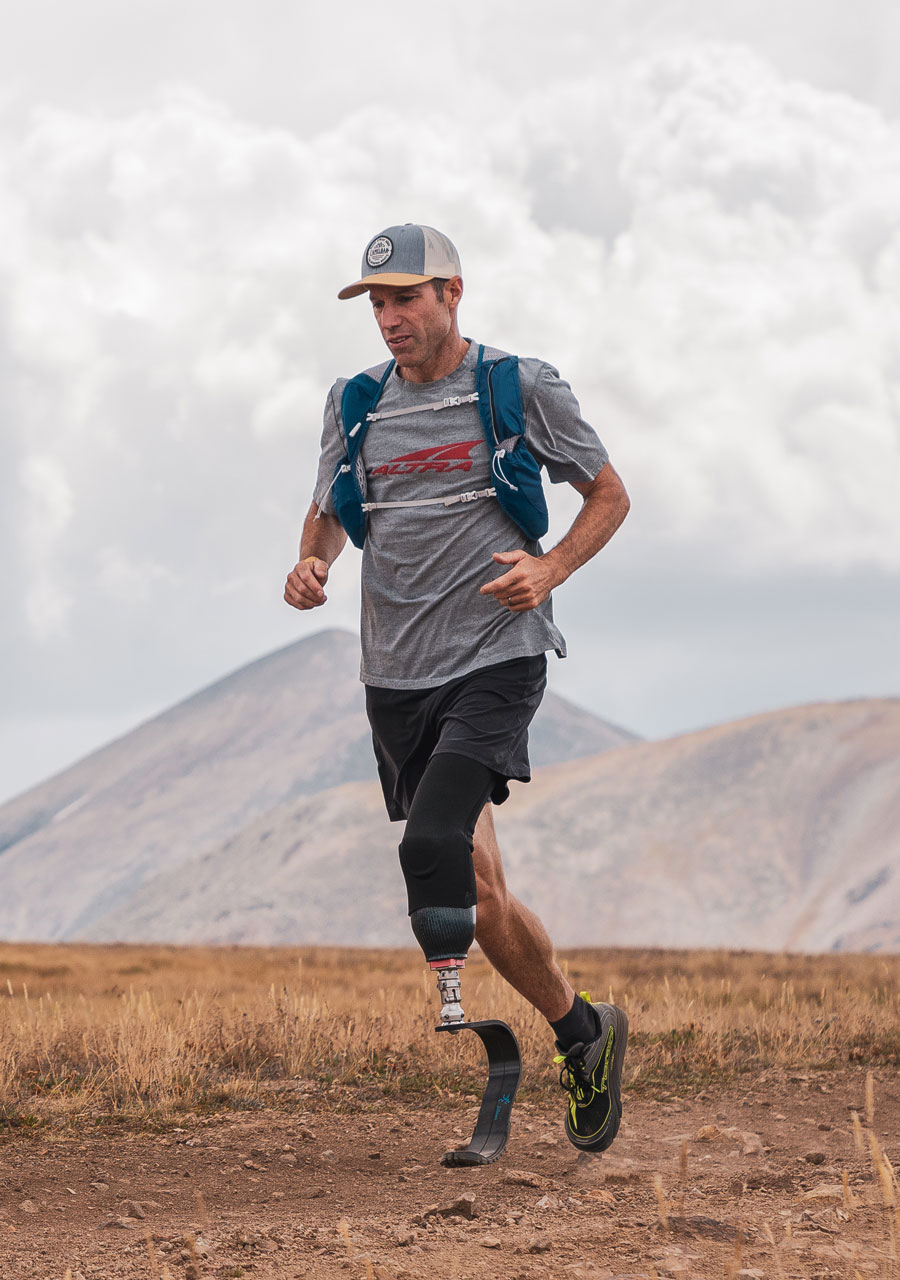y spring 2015, Dave Mackey ’92 had a hard-earned reputation for toughness. The Maine native and onetime UNH soccer player was a decorated ultra-runner, competing in races of 100 miles or more and garnering multiple runner of the year awards. He was a physician’s assistant, married to fellow Wildcat Ellen Bilek ’92 and father to two young children, living in the endorphin capital of Boulder, Colorado.
But Mackey’s life changed forever on May 23, 2015, the day he headed out for a typical three-hour training run through the hills surrounding Boulder. On Bear Peak, he stepped on a boulder he’d pushed off of hundreds of times before. This time, however, the rock dislodged, loosened by days of heavy rain. “It was about a 300-pound rock,” Mackey recalls. “I tumbled about 60 feet and landed on my back, amongst some scree.” He survived the fall, but the boulder tumbled behind him and came to rest on his left leg, pinning him down and creating an open tibial fracture.

A friend Mackey had passed earlier eventually heard his cries and rushed to help, levering the boulder off Mackey’s shattered leg. Rescue crews were called, and in lashing rains, Mackey was lowered 600 feet off the peak and taken to Boulder Community Hospital. His leg was set, and Mackey’s doctor was optimistic.
“I remember clearly — there’s a video clip from a local news station — on the night of the accident, the surgeon was saying ‘Dave’s expected to make a full recovery,’” Mackey says. “And that was my perspective.”
But an infection, likely caused by the soil mixing with the open wound, took hold. Over the next 18 months, Mackey endured 12 different operations to save his leg. Nothing worked. Finally, Mackey scheduled one more surgery.
“Given the fact that there was no healing going on, and after discussing it with professionals and other amputees, we thought amputation was the best choice,” he says. “I knew if I didn’t lose it, I’d be dealing with a very dysfunctional, painful leg, with all kinds of scar tissue, for the rest of my life.”
It was difficult, but Mackey applied his trademark grit to his rehab and recovery, with the goal of getting back to athletics as quickly as possible. Six weeks after the amputation (he’d hoped for two) he was walking. Two and a half months out, he hiked back to Bear Peak, the site of his accident. “That was a big moment,” he says.
Eager to return to running, Mackey was fitted with a high-tech Fillauer running blade. Four or five months after the amputation, he ran five miles. “After that, I knew I wanted to go back and complete some of the races that, in the past, had been a benchmark,” he says.
In 2018, 20 months after the amputation, Mackey completed Colorado’s grueling Leadville series, a seven-week sequence of six events —a trail marathon, 50-mile mountain bike race, 50-mile run, 100-mile mountain bike race, 10K trail run, and 100-mile trail run — all at elevation. In 2014, Mackey finished second. Four years later, he was the last competitor to beat the 25-hour cutoff.
That finish revealed Mackey’s new reality: He no longer races to win, but to compete. “When I had the accident, I still had goals,” he says. “I was a sponsored athlete, and fortunately, I still am. I regret not being able to do a few races, but that’s pretty minor. It’s a totally different experience. I think I’ve come to terms with it.”
Mackey often hesitates when discussing his accident, amputation, and subsequent recovery, acknowledging that the loss still stings. But he also brings the perspective of an urgent-care professional who has seen far worse outcomes.
“I should have died from the fall,” he says. “I appreciate life more. I’d rather have my leg back and be out there doing what I did before. Then again, I wouldn’t have the same knowledge, or be the same person, if this didn’t happen to me. Anyone who has had a near-death experience is not the same.”